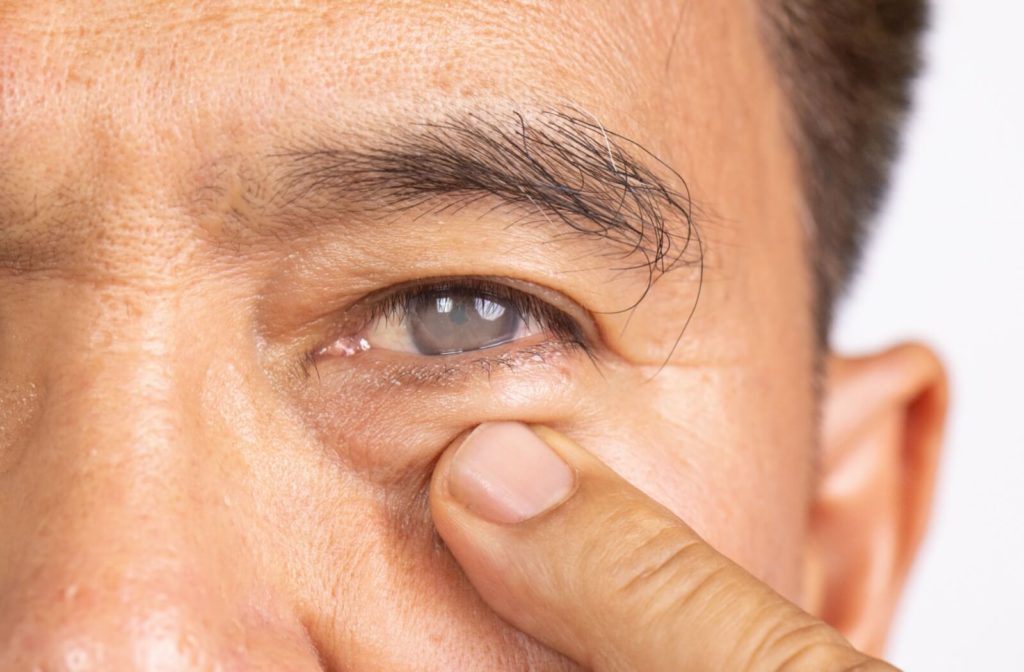Cataracts are one of the most common causes of vision impairment around the world. While they can sound intimidating, they’re often manageable with early diagnosis and care. Understanding what to look for in the early stages can help you protect your vision and plan the right next steps.
The first sign of cataracts is typically blurry or cloudy vision that may feel like you’re looking through a foggy window. As the condition progresses, additional symptoms can develop, including faded colours, glare sensitivity, and difficulty seeing at night.
Knowing what to watch for and when to seek help can make all the difference in preserving your sight.
What Are Cataracts?
A cataract forms when the clear lens inside your eye begins to cloud over. Your lens plays a critical role in focusing light onto your retina, allowing you to see clearly at various distances. As the proteins in the lens begin to break down and clump together with age, they create cloudy patches that distort your vision.
This cloudiness tends to develop gradually over time, which is why many people don’t immediately notice symptoms. Cataracts are progressive, meaning they get worse over time if not addressed. That’s why early detection is so important.
What Causes Cataracts?
While aging is the most common cause, other factors can contribute to the development of cataracts. These include:
Common risk factors
- Ultraviolet (UV) radiation exposure: Long-term sun exposure without eye protection can damage the lens.
- Smoking: Smoking introduces toxins that accelerate the breakdown of lens proteins.
- Family history: Genetics can play a role in how likely you are to develop cataracts.
- Medical conditions: Health issues like diabetes can increase your risk.
- Medications: Long-term use of corticosteroids and some other medications can raise your risk.
- Previous eye injuries or surgeries: Trauma or surgical procedures may affect the lens and increase the chance of cataract formation.
While these risk factors can’t always be avoided, regular eye exams can help identify changes before they significantly affect your vision.
The Early Signs of Cataracts
Recognizing early cataract symptoms is the first step toward effective management. Most people don’t realize something is wrong until they notice changes in how they see day-to-day.
Watch for these early symptoms
- Blurry or cloudy vision: Things may appear hazy, almost like you’re peering through frosted glass.
- Difficulty reading small print: You might need brighter lighting or find that your reading glasses no longer help.
- Increased glare: Bright lights, particularly at night, can cause discomfort or halos.
- Faded or yellowing colours: Colours may lose their vibrancy, appearing dull or washed out.
- Double vision in one eye: You might see multiple images with one eye, even if the other is unaffected.
- Night vision problems: Driving at night can become more difficult due to glare and reduced contrast.
These symptoms tend to worsen over time. If you notice any of them, it’s important to schedule a comprehensive eye exam for a proper diagnosis.

Can Cataracts Lead to Blindness?
While cataracts start as a mild inconvenience, they can eventually lead to severe vision loss if left untreated. As the lens becomes more clouded, it blocks light from reaching the retina. In advanced cases, cataracts can cause near-total blindness.
The good news is that cataracts typically progress slowly. With routine eye exams, optometrists can catch them in the early stages and recommend treatment before your vision becomes significantly impaired.
How Are Cataracts Treated?
There’s no way to reverse cataracts once they’ve formed, but symptoms can be managed depending on their severity.
If cataracts are in the early stages and not yet affecting your daily life, your optometrist may recommend:
- Stronger prescriptions: Updating your glasses or contact lenses can improve vision temporarily.
- Anti-glare coatings: Glasses with anti-reflective coatings can reduce glare, especially at night.
- Improved lighting: Brightening your reading or workspace can make daily tasks easier.
- UV protection: Wearing sunglasses that block UV rays can slow the progression of cataracts.
These approaches can be effective in the short term, but they won’t stop cataracts from progressing.
Cataract Surgery: What to Expect
When cataracts begin to interfere with your quality of life, surgery becomes the most effective solution. Cataract surgery is a common and highly successful procedure in Canada, with minimal recovery time. During the procedure:
- You’ll receive a local anaesthetic to numb the eye.
- A small incision is made, and ultrasound technology is used to break up and remove the cloudy lens.
- A clear, artificial intraocular lens (IOL) is inserted in place of the natural lens.
The incision usually heals on its own without stitches. Most surgeries are completed in under an hour, and patients often return home the same day. For aftercare and recovery:
- You may experience mild discomfort, dryness, or light sensitivity for a few days.
- Eye drops will be prescribed to prevent infection and reduce inflammation.
- Your optometrist will schedule follow-up visits to monitor healing and visual improvement.
Many patients notice clearer vision within a few days and enjoy long-term results with their new lens.
When Should You See an Optometrist?
Don’t wait for vision to worsen before seeking care. Schedule an eye exam if:
- You notice any of the early signs mentioned above
- You’re over 60 and haven’t had a recent eye exam
- You have risk factors like diabetes, high UV exposure, or a family history of cataracts
Comprehensive eye exams are the best way to monitor your eye health and catch conditions like cataracts early.
Your Eye Health Is Our Top Priority
Cataracts are a common part of the aging process, but they don’t have to rob you of your vision. Understanding the first signs of cataracts and staying on top of your eye health can help you preserve your sight and independence for years to come.
At Henderson Vision Centre in Winnipeg, MB, our knowledgeable and compassionate team is here to support you every step of the way. We offer thorough eye exams, advanced diagnostics, and trusted referrals for cataract surgery when needed.
If you’re noticing changes in your vision, or simply due for a check-up, book an appointment with us today. We’re proud to be your partner in lifelong vision care.



